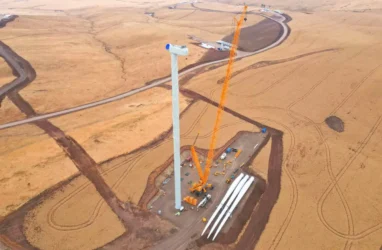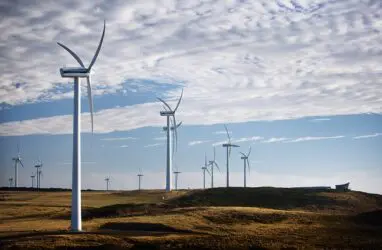Feed aggregator
Ten start-up battery innovators tapped to join Supercharge Australia incubator
The post Ten start-up battery innovators tapped to join Supercharge Australia incubator appeared first on RenewEconomy.
South Australia breaks wind output record for first time in two years as new projects boost capacity
The post South Australia breaks wind output record for first time in two years as new projects boost capacity appeared first on RenewEconomy.
‘Puppy blues’: how to cope with the exhaustion and stress of raising a puppy
Australia’s biggest industrial polluter receives millions in carbon credits despite rising emissions
Safeguard mechanism revamp leads to overall emissions fall but 70% of coal and gas facilities covered by scheme increased direct pollution
Australia’s biggest industrial climate polluter – Chevron’s Gorgon gas export plant in Western Australia – received the equivalent of millions of dollars in carbon credits from the federal government last year, despite increasing its emissions.
The revelation in government data last week has sparked calls for changes to the safeguard mechanism, the government policy applied to the country’s 219 largest industrial climate polluting facilities.
Get Guardian Australia environment editor Adam Morton’s Clear Air column as an email
Continue reading...Fifteen years after Deepwater Horizon, Trump is setting the stage for disaster | Terry Garcia
Cuts to science, environmental and safety agencies are a rejection of hard-won knowledge gained from studying the disaster that occurred 15 years ago
Last month, I joined nearly 500 former and current employees of National Geographic, where I was executive vice-president and chief science and exploration officer for 17 years, urging the institution to take a public stance against the Trump administration’s reckless attacks on science. Our letter pointed out that the programs being dismantled are “imperative for the success of our country’s economy and are the foundation of our progress and wellbeing. They make us safer, stronger and more prosperous.” We warned that gutting them is a recipe for disaster.
In the face of this danger, none of us can remain silent.
Terry Garcia was National Geographic’s executive vice-president and chief science and exploration officer for 17 years. He also served as the assistant secretary of commerce for oceans and atmosphere and deputy administrator of Noaa, as well as its general counsel
Continue reading...British Steel must now join the modern economy, not be a prisoner of the old | Will Hutton
Lack of investment and vision has dogged UK industry, while China has literally forged ahead
The fate of incoming Labour business and industry secretaries seems to be to launch emergency rescue packages for industries that would otherwise face imminent closure.
Witness Jonathan Reynolds at last Saturday’s extraordinary parliamentary recall arguing for the legal right to take over the running of British Steel from its Chinese owner, Jingye, in order to save up to 3,500 jobs and Britain’s strategic capacity to make steel. And witness Tony Benn, in 1974, offering a financial lifeline to 3,000 workers forming a cooperative to save motorcycle manufacture at the failed BSA plant in Meriden, near Coventry.
Continue reading...Oldest serving US astronaut returns to Earth on 70th birthday
Miliband in blistering attack on Farage’s UK net zero ‘nonsense and lies’
The energy secretary has accused Reform UK’s leader of peddling dangerous falsehoods about renewable power
• Tories and Reform use the steel crisis to knock clean energy. They’re wrong: it will secure all our futures
Ed Miliband has torn into Nigel Farage and the Tories for peddling dangerous “nonsense and lies” by suggesting the UK’s net zero target is responsible for destroying Britain’s businesses, including its steel industry.
Cabinet ministers are determined to fight back against the way Reform UK and the Conservatives have unceremoniously lambasted the climate crisis agenda for what they believe are nakedly political reasons before important local elections next month.
Continue reading...There’s only one way to fight the climate greenlash: appeal to the naysayers’ self-interest | Martha Gill
If green policy is going to survive the backlash, it needs a new pitch – cleaner air, cheaper bills and healthier cities
For a decade, green activists in Britain have been congratulating themselves on their luck. Unlike in many countries in Europe, where motorists, farmers and rightwing groups have been driving anti-climate action, the UK has long enjoyed a comfortable political consensus on the subject. But conditions for a greenlash are assembling.
Most Britons still say they support climate efforts, but the price of decarbonising may at last be about to hit our wallets. Meanwhile, the Conservative party has come a long way since it sported a little green oak tree as its logo. Last month, Kemi Badenoch declared a full culture war against net zero, which she said couldn’t be achieved “without a serious drop in our living standards or by bankrupting us”.
Do you have an opinion on the issues raised in this article? If you would like to submit a letter of up to 250 words to be considered for publication, email it to us at observer.letters@observer.co.uk
Continue reading...Fears that UK military bases may be leaking toxic ‘forever chemicals’ into drinking water
Bases in Norfolk, Devon and Hampshire face MoD investigation over possible leaching of dangerous PFAS into environment
Three UK military bases have been marked for investigation over fears they may be leaking toxic “forever chemicals” into drinking water sources and important environmental sites.
The Ministry of Defence (MoD) will investigate RAF Marham in Norfolk, RM Chivenor in Devon and AAC Middle Wallop in Hampshire after concerns they may be leaching toxic PFAS chemicals into their surroundings. The sites were identified using a new PFAS risk screening tool developed by the Environment Agency (EA) designed to locate and prioritise pollution threats.
Continue reading...As the major parties duke it out over energy, here’s what teals and key independents have to say
The post As the major parties duke it out over energy, here’s what teals and key independents have to say appeared first on RenewEconomy.
Rare footage captured of interspecies infanticide by dolphins off Welsh coast
Dolphin-watching tour witnesses four adult bottlenose dolphins kill a common dolphin calf in Cardigan Bay
They had been hoping for a nice day out on the bay. Instead, dolphin-watching tourists in Wales were confronted with the shocking and grisly sight of four adult bottlenose dolphins pursuing and killing a common dolphin calf.
The trip, in Cardigan Bay, was operated by Dolphin Spotting Boat Trips and the Sea Watch Foundation (SWF), a charity that monitors the dolphins in the bay to inform and advise on their conservation status and protection.
Continue reading...How a Sydney scientist became enamoured with the ‘Ferraris of the crustacean world’ – and discovered a new shrimp species
Prof Shane Ahyong discovered ‘brutish’ mantis shrimp so unusual it needed its own new genus
- Get our afternoon election email, free app or daily news podcast
When Prof Shane Ahyong was seven, his mum came home with a bag of prawns from the fish shop – but one of those things was not like the others.
“It just looked different,” said Ahyong.
Sign up for the Afternoon Update: Election 2025 email newsletter
Continue reading...Huge 2 gigawatt, 20 GWh pumped hydro proposal wins state government backing
The post Huge 2 gigawatt, 20 GWh pumped hydro proposal wins state government backing appeared first on RenewEconomy.
UK national parks warn of ‘catastrophic’ risk from wildfires this Easter
Weeks of fires amid warm and dry spell have decimated ecosystems and threatened endangered species, say experts
Britain’s national parks have warned of a “catastrophic” risk from wildfires this Easter after one of the driest early spring seasons on record.
Park rangers from the South Downs to the Highlands said the prolonged warm weather and breezy conditions had left large areas extremely dry despite recent rain.
Continue reading...Week in wildlife: elephants on parade, a rescued serval and wandering bears
The best of this week’s wildlife photographs from around the world
Continue reading...Climate change is not just a problem of physics but a crisis of justice
In an exclusive extract from Friederike Otto’s new book, she says climate disasters result from inequality as well as fossil fuel
My research as a climate scientist is in attribution science. Together with my team, I analyse extreme weather events and answer the questions of whether, and to what extent, human-induced climate change has altered their frequency, intensity and duration.
When I first began my research, most scientists claimed that these questions couldn’t be answered. There were technical reasons for this: for a long time, researchers had no weather models capable of mapping all climate-related processes in sufficient detail. But there were other reasons that had less to do with the research itself.
Continue reading...Weather tracker: sandstorm turns Iraqi skies orange and empties the streets
Thousands go to hospital with respiratory problems after massive dust cloud blows in from Saudi Arabia
Iraq was hit by its most severe sandstorm of 2025 this week, turning skies from blue to an orange haze. Visibility dropped to less than half a mile, causing travel disruptions, with two major airports halting flights, and streets in Basra, the largest city in southern Iraq, deserted. Respiratory problems sent thousands to hospital. The storm also affected Kuwait, where wind gusts exceeded 50mph, and visibility in some areas was diminished to zero.
This massive dust cloud originated in Saudi Arabia before being blown into Iraq. While dust storms are common in Iraq, the climate crisis is expected to intensify them across the region in the future, fuelled by desertification in Saudi Arabia and Syria.
Continue reading...From butterflies to wind turbines, project preserves world’s sonic heritage
Online exhibition collects soundscapes from nature reserves and sites such as Machu Picchu and Taj Mahal
The sounds of wind turbines, rare whales and the Amazonian dawn chorus are among the noises being preserved as part of an exhibition of soundscapes found in world heritage sites.
The Sonic Heritage project is a collection of 270 sounds from 68 countries, including from famous Unesco-designated sites such as Machu Picchu and the Taj Mahal, as well as natural landscapes such as the monarch butterfly sanctuary in El Rosario, Mexico and the Colombian Amazon.
Continue reading...Small Tasmania wind project finally begins construction after long delay and political reprieve
The post Small Tasmania wind project finally begins construction after long delay and political reprieve appeared first on RenewEconomy.








